Bevy’s Community Event Management Platform [Review]
What Is It?
Bevy is an event management platform purpose-built for organizations, primarily enterprises, seeking to grow global engagement through a network of community events. It’s designed to facilitate virtual, in-person and hybrid events with tools used not just by event managers, but also local community leaders, including volunteers. Not a third-party platform, Bevy is a white-labeled product that allows each client to house all events in a single location on their own domain.
Main Feature Categories
Group/Local Organizers Tools. These comprise a wide range of event management functions, enabling local organizers to create and host community events that run the gamut from workshops and webinars to hackathons and happy hours. They comprise a range of event management and analytic functions.
HQ Team Tools. These enable the headquarters team to oversee and create new chapters or community groups and use analytics to collect and compare data on events, registration, sponsors and attendees. Among many other features are tools for managing marketing, email, social media and global sponsors.
Virtual Conferences. Bevy’s virtual conference platform provides all the features typically required for virtual events, with the added capability of working in concert with the broader community event platform.


Review
A major result of the pandemic — and the isolation it brought many — is a growing hunger for community interaction. At the same time, many companies have increasingly recognized the value of marketing, which encourages the consumers of their products to share experiences and insights with each other.
Given this, Bevy’s platform which melds tools for event management with those for fostering community participation couldn’t be more timely. While enterprise clients can use Bevy solely as a virtual event platform, the real value is that they also have access to the elements for building community participation and engagement.
Various tools within the platform are tailored for the needs of professional event managers as well as community group leaders, many of whom may be volunteers. At the same time, companies can oversee their community groups and retain control over what the community organizers see or do not see.
Among the most useful features are the ability to measure and analyze the engagement level and behavior of attendees at conferences and community events, a process that begins when attendees sign on for an event. Companies can use this comprehensive data according to their needs, whether for marketing purposes or making improvements to future events. For example, the virtual conference platform enables users to track how many people showed up for sessions and how long they stayed, factors useful for determining how effective the speakers were and which ones should be brought back for the next event.
The efficiency of the platform is especially evident when it comes to processing attendee surveys, greatly cutting down on the work involved. This is a huge potential timesaver for companies where a handful of administrators may be charged with processing hundreds or even thousands of event surveys per week. With Bevy’s survey functionality, the data can be automatically served up to the event organizer without the need for manually combing through a multitude of forms.
In particular, Bevy should appeal to organizations who want community outreach on a global scale. Used by a number of global companies such as Salesforce and Atlassian, the platform is built to serve international audiences. Supporting over 20 languages and growing, many local organizers can use the platform in the language they primarily speak.
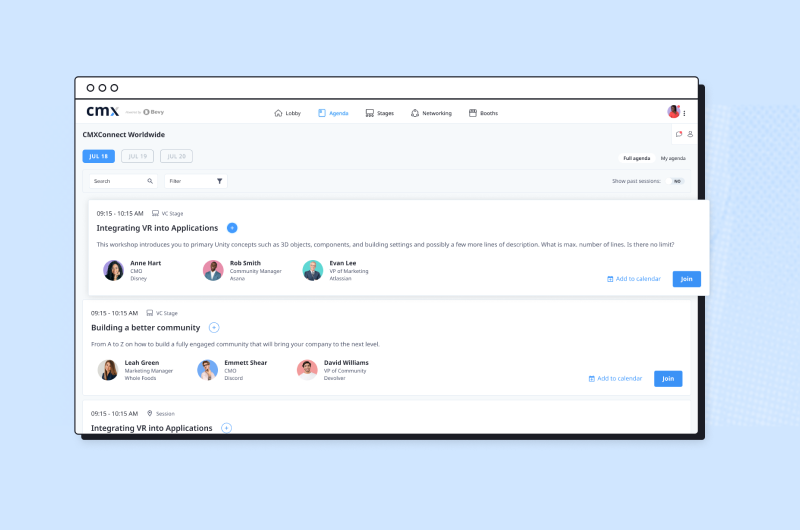

Who’s it for?
Bevy was built for driving customer, employee and community engagement by leveraging community leaders and volunteers to help drive these efforts. The platform facilitates community development at scale while minimizing lift by allowing organizations to employ end-users and similar stakeholders to take up the task of planning events and producing content on the platform.
As such, its target audience includes large and mid-size enterprise companies — especially those with large-scale user conferences — as well as educational institutions, nonprofits and associations that are ready to expand into local chapters. This audience is typically focused on areas of impact that include customer success, customer acquisition, advocacy, content creation, product innovation and customer support.
Bevy does offer a virtual platform that professional event planners can use without relying on a network of community volunteers, but its most notable differentiators are grounded in community-oriented benefits and the ability to scale events and content while keeping the lift for the organization to a minimum. Organizations for which scaling and community engagement are major priorities may find Bevy to be uniquely designed specifically to support them.
Who’s it not for?
Where Bevy may have limited appeal is among trade shows and complex citywide conventions, especially those with an exhibition component, with controlled stakeholder relationships that may not translate as easily to a community-driven or user-generated model.
While some associations who run numerous regional events with help from local chapters may find Bevy a useful partner, others who already have a successful program of locally driven regional events managed by their chapters may not see the need, and will have to evaluate Bevy against whatever member management software is already supporting those operations, though it will be interesting to see whether event tech platforms like Bevy make a case for consolidating member management and event tech stacks for the association sector.
Features
Virtual Platform: Bevy offers a full-scale platform for community that works in tandem with its virtual events platform. Pre-event features include a built-in registration system with an SEO-optimized landing page, event analytics dashboard, automated and customizable email marketing, payment processing, a searchable attendee list and more. Stage capabilities include an unlimited number of viewers, presenting up to five speakers on camera when sharing, private backstage chat and speaker management and full moderator capabilities. Also offered are an unlimited number of concurrent sessions (both live and pre-recorded), audience interaction, one-on-one live video chat matchmaking and breakout rooms for up to 50 people per room. For expos, capabilities include unlimited concurrent virtual booths and tools for lead generation like linking to calendars, PDFs, and other artifacts.
Community Group Management and Growth: A wide range of flexible features allow the headquarters team to manage chapter or community groups and build up local networks of community leaders and teams of volunteers. Among the tools for chapter growth and participation are templated forms that can be filled out by anyone wanting to become a group leader or participate as a speaker or sponsor. Administrators can manage the list of community participants as they join or depart from the network.
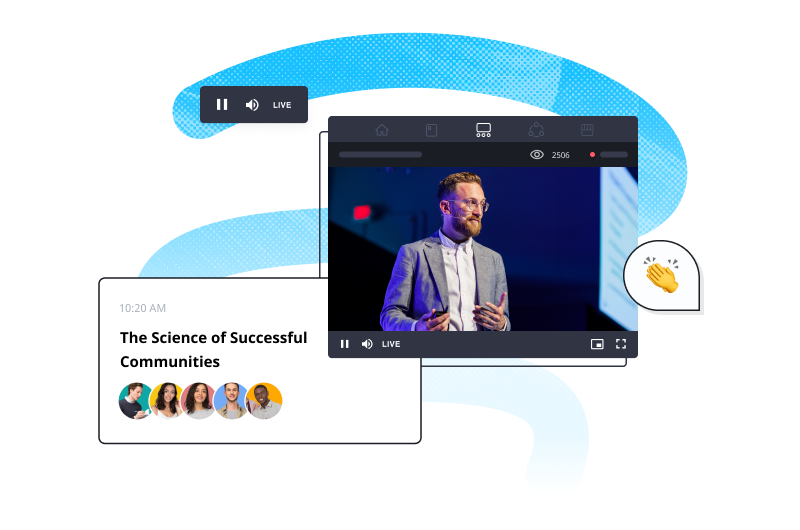

Community Events. A variety of tools enable local organizers to create and host community events, including webinars, workshops and social gatherings. The many event management capabilities include ticket payments, attendee check-in, newsletters, attendee email lists, speaker database and wrap-up functions to post photos, videos and presentations. There are also analytic features that track data on registration, attendees, sponsors and events, with yearly, quarterly and monthly comparisons.
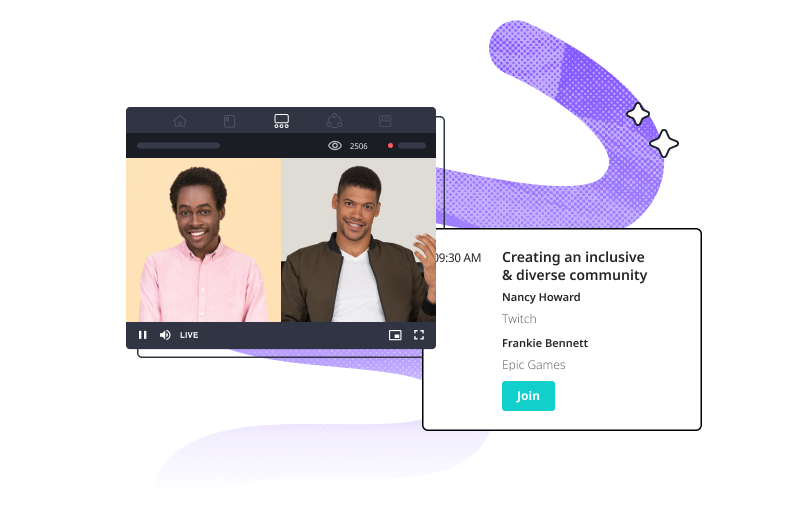

Group Locator. Participants can search the organization’s website for the community groups they wish to join based on such criteria as geographic location or special interest, allowing for cross-pollination among interest categories within a given brand. For example, a woman who works in IT support for a mayor’s office might want to join a group for women in tech as well as one for government employees.
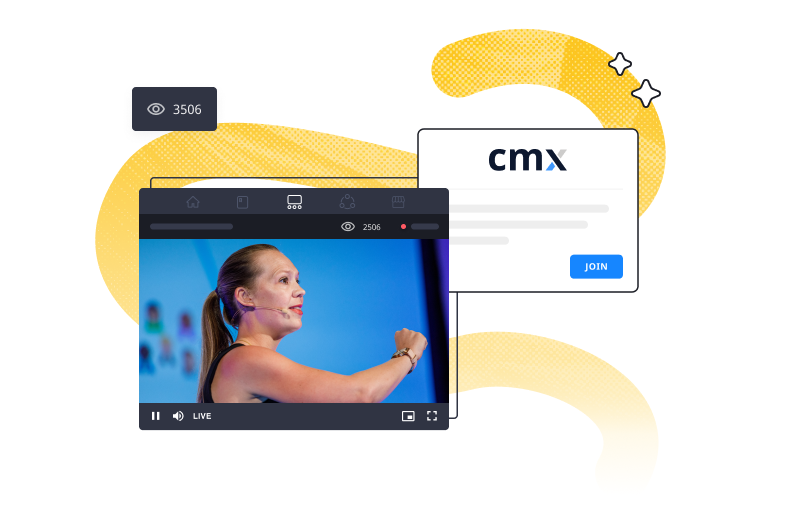

Data Collection/Analytics. Throughout Bevy are features for tracking attendee engagement and behavior, providing measurable and comparable data that is filtered by attendee type and location. The results can be used for marketing purposes as well as for improving future events. The data captured is also integrated with common enterprise toolsets like Salesforce, Marketo, HubSpot, and more.
White-Label Service. Bevy provides a white-label experience for customers, with customization that fully conforms to the branding, website design, protocol and language used by the organization.
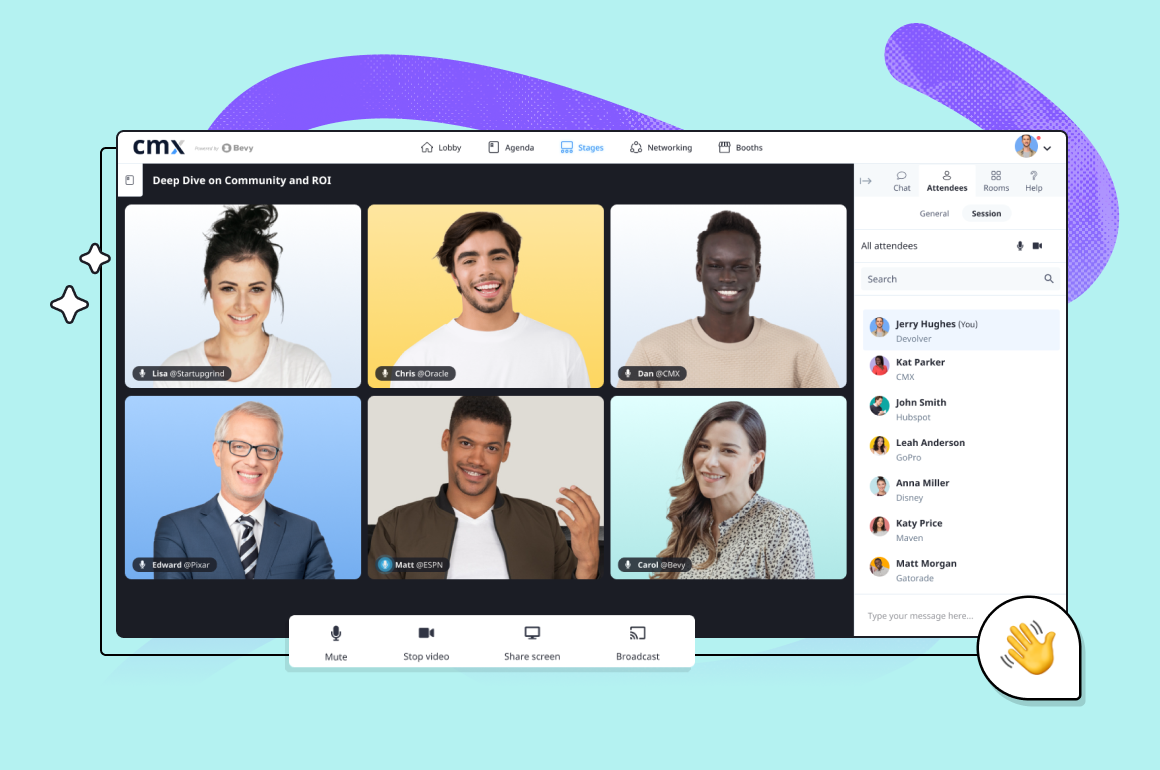

Pricing and Plans
Bevy offers two pricing models, one for community events and one for virtual conferences.
In addition to a one-time implementation fee, community events are charged according to the total number of groups on the platform (a group is defined as a city or area where events are hosted). As more groups are added, the average cost per group decreases.
Bevy’s virtual conference fee is based on the number of registrants. There are also additional fees for implementation, annual platform add-ons and one-time service add-ons.
Pros and Cons
PROS
- Bevy’s community platform offers a broad range of tools for continual engagement with customers, prospects and employees.
- The platform is designed for global audiences, serving 20 different languages and growing, and enabling brands to expand through a worldwide network of events.
- As a white-label platform, Bevy supports the particular nuances and branding of each customer, creating a hub that lives within the organization and not a third-party location.
- Customers have full ownership of their data, which cannot be sold, licensed or used for marketing by anyone else.
CONS
- Bevy’s primary differentiators are not designed to appeal to large, complex events that cannot be taken up and scaled by community volunteers, or for which the value proposition of the event brand is based on unique control and facilitation of the relationships between event stakeholders (e.g. buyers and suppliers).
IN CONCLUSION
With both virtual events and community outreach a growing priority for many organizations, Bevy’s capabilities on both fronts should resonate in the marketplace. Organizations will find that they not only get a platform that provides what they need for virtual and hybrid events, but one that enables them to grow outreach in a worldwide community network.
Disclaimer: Reviews are paid for placements. While Event Manager Blog receives a fee to extensively look at the tool and review it in detail, the content of the review is independent and by no means influenced by the company. If you have any questions please use the contact us section.
![Bevy’s Community Event Management Platform [Review]](https://meetings.skift.com/wp-content/uploads/2021/09/1160-x-770px-FEAT-review-bevy.jpg)